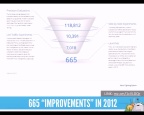Ranking refers to the order of URLs on the search engine results page (SERP) and the process search engines use to determine these results. Search visibility refers to how prominently a piece of content is displayed in search engine results. Highly visible content ranks in the top few positions resulting in more traffic from search. Ranking factors are the often evolving, and commonly disputed criteria search engines use to determine the results on a page for any given search. Understanding how search engines think, and rank content gives you the tools to create an SEO strategy and drive more organic traffic.
Are your a professional SEO? Dive into the All about Google: The SERPs chapter of the Professional's Guide to SEO.
This page is your home base for search engine ranking and visibility resources designed for learners of all skill levels. Discover our top SEO guides, blog posts, articles and more!
MozCon Video Bundle
Did you miss this year's MozCon? Now is your chance to experience what everyone has been talking about! We have over 19 hours of actionable inbound marketing knowledge.
Google RankBrain
Learn about RankBrain, semantic search, and their role in Google's search algorithm.
Robots Meta Directives
Whereas robots.txt file directives give bots suggestions for how to crawl a website's pages, robots meta directives provide more firm instructions on how to crawl and index a page's content. Learn more about what robots meta directives are all about and how to use them in this article.
Google Penguin
Learn about Google's Penguin algorithm update and it's impact on search visibility.
Google Panda
What is Google's Panda algorithm update, and what did it do to affect ranking and search visibility? How can you avoid "Panda penalties?" Learn in this article.
Off-Page SEO
Off-site SEO" (also called "off-page SEO") refers to actions taken outside of your own website to impact your rankings within search engine results pages (SERPs). Learn just what those "actions" are, why they matter, and how to get started with your own off-site efforts in this article.
On-Site SEO
Learn what "on-site SEO" is all about – and how it contributes to the search visibility of a webpage or website as a whole.
Google Search Operators
Google search operators are special characters and commands (sometimes called “advanced operators”) that extend the capabilities of regular text searches. Search operators can be useful for everything from content research to technical SEO audits. Learn more about them in this article.
Meta Description
What is a meta description, and why do they matter for SEO? What does it take to create an SEO-friendly meta description? Learn in this article.
Schema.org Markup
Learn what schema.org structured data is and why it matters for search engine optimization.
Robots.txt
What is robots.txt, and how does it impact a website's search visibility? How do you create SEO-friendly robots.txt files? Learn in this article.
Page Speed
Why does page speed matter for SEO, and how can you impact the speed of your own website? Learn the basics in this article.
Conversion Rate Optimization
Conversion rate optimization (CRO) is the systematic process of increasing the percentage of website visitors who take a desired action — be that filling out a form, becoming customers, or otherwise. Learn about the multidisciplinary and often complex CRO process in this article.
Canonicalization
What is canonicalization? How do you implement the canonical tag on a webpage, and why does it matter for search engine optimization? Learn in this article.
International SEO
International SEO is the process of optimizing your website so that search engines can easily identify which countries you want to target and which languages you use for business. Learn the basics in this article.
Duplicate Content
When it comes to SEO, what actually counts as duplicate content? Why does duplicate content matter for SEO, and how can you avoid the ranking issues that may stem from it? Learn in this article.
Title Tag
A title tag is an HTML element that specifies the title of a web page. Learn how to write SEO-friendly title tags (and check out the Title Tag Tool!) in this article.
SEO in Real Life: Harnessing Visual Search for Optimization Opportunities
In this sneak peek of her MozCon 2022 presentation, Crystal shows how, though SEOs have little control over which photos people take, we can optimize our brand presentation to ensure we are easily discoverable by visual search tools.
How We Increased Revenue with Speed Optimization [Local SEO Case Study]
There are some key scenarios when local SEOs should seriously consider speed optimization, even for a small local client. Small local clients are still impacted by the issues that come along with having a slower website such as higher bounce rates, lower conversions, and worst of all, a poor user experience. Amanda shares her experience with speed optimization, and the positive results for her client.
How to Know When You Need a Dedicated Paid Landing Page
Creating custom, campaign-specific landing pages is resource-intensive, and not every team has the necessary tools, expertise, or personnel to build the content. So, how do you know if you need a custom page, or if you can safely send paid traffic to an organic page and still achieve your KPIs? This three-step, data-driven evaluation helps answer this question.
Level-Up Your Search Strategy with the Professional’s Guide to SEO
Over 14 million people have cut their SEO teeth on our Beginner's Guide to SEO, learning the ins and outs of search engine optimization from scratch. Now, for the first time, we're introducing the next-step resource to take you from practicing SEO to preaching it.
Case Study: How the Cookie Monster Ate 22% of Our Visibility
The team at Homeday is currently carrying out a website migration in several stages, or waves, to reduce the risk of problems that have a large-scale negative impact. During the first wave, they encountered an issue with their cookie consent, which led to a visibility loss of almost 22% within five days. In this article, Hanna describes how they discovered and resolved it.
Shopify SEO: The Guide to Optimizing Shopify [Updated for 2022]
Shopify is an increasingly popular platform for e-commerce sites, but it's not fully SEO-friendly out of the box. What's the best way to optimize your Shopify experience for SEO?
22 Smart Google SEO Tips for 2022
We're back with a brand new season of Whiteboard Friday episodes for your viewing pleasure. First up: SEO expert Cyrus Shepard shares his top 22 tips for successful Google SEO in 2022. Watch to find out what to prioritize and what to look out for in the year ahead!
Track Indented Results in STAT (New)
Our STAT Product team has been hard at work implementing indented results in rank tracking and they are now available in SERP feature tracking. Here’s a quick walk-through of how to put indented results data to work.
Why Getting Indexed by Google is so Difficult
Most websites, big or small, have lots of content that should be indexed — but isn’t. In this post, let’s address some of the most common issues, and how to mitigate them.
Links and Brand as Ranking Factors: 2021 Correlation Study
Do links or brand authority truly correlate with ranking on the SERPs? This study of the first 20 organic results for every MozCast keyword suggests that yes, they do, but with some important considerations.
Should You Pay for Local Listings Management? Double-Digit Lifts and Customers Say: Yes!
Does citation management still matter in the grand scheme of local SEO? Our industry has been trying to gauge which way the wind is blowing on this subject for years now, but a recent study suggests that —yes — local businesses should be investing in listing management.
Performance as a Ranking Factor: The State of the Web and Core Web Vitals [Part 3]
Are Core Web Vitals correlated with rankings? If so, is that any more true than it was before the Page Experience Update? In the third and final post of this series, we’ll see what the data tells us about the relationship between CWV metrics and organic ranking performance.
Web Content Accessibility Guidelines: What They Are and Why SEOs Should Care
In this blog, we’ll take a closer look at Web Content Accessibility Guidelines (WCAG), and outline the steps you can take to meet its standards. We’ll also touch on the reasons why accessible websites typically rank higher in search engines — making accessibility the right choice all around!
Announcing the New Technical SEO Certification Series: What It Is & How to Get Certified
The Moz Learning Team has put in many, many hours of work to develop a technically focused, in-depth training series that hones in on the nuts and bolts of technical SEO. We’re thrilled to announce the launch of the Technical SEO Certification Series through Moz Academy.
Google Hummingbird
What is Google's "Hummingbird" algorithm update? What influence did this update have on how search results are built? Learn in this article.
Rankings Correlation Study: Domain Authority vs. Branded Search Volume
Is branded search volume as important as link metrics when it comes to ranking? Check out the results of this correlations study and explore how these factors might influence the SERPs.
SEO Rankings Drop: A Step-by-Step Guide to Recovery
There are hundreds of things that could cause your Google organic rankings to drop. Follow this handy guide to figure out what went wrong, and what you can do about it.
Mastering Google Search Operators in 67 Easy Steps
Google search operators are like chess – knowing how the pieces move doesn't make you a master. Dive into 67 examples, from content research to site audits, and level up your search operator game.
I've Optimized My Site, But I'm Still Not Ranking—Help!
When all your hard work seems to be going nowhere, there might be a reason. Jo Cameron walks you through a list of things to check and accomplish to make sure your site can start ranking ASAP.
Game of Featured Snippets: How to Rank in Position 0
If two competing domains both have great, snipp-able results, how does Google choose one over the other? Larry Kim has an idea, and it has everything to do with your engagement metrics.
Ranking #0: SEO for Answers
Featured Snippets have increased 5X since their launch two years ago, and are here to stay. Find out why they represent a real organic search opportunity and how to put them to work for your sites.
How Long Do Backlinks Take to Show Effect?
The eternal question: How much time does it take for a link to affect rankings? Kristina Kledzik breaks out the entire process from start to finish.
30+ Important Takeaways from Google's Search Quality Rater's Guidelines
Last week, Google made the unprecedented move of releasing the entire Search Quality Rater’s Guidelines. Explore key insights from this 160-page document that details just what they're looking for in a webpage.
The Illustrated SEO Competitive Analysis Workflow
An integral part of keyword research is an in-depth look at your competition. This post offers a concise flowchart to visualize and guide you through that process.
Helpful Tips for Doing Search in a Low-Volume Niche
Harmonizing your organic, paid, and CRO efforts is key to finding success when you do SEO in a low-search volume niche. Get inspired by these tips and strategies for maximizing what you have to work with.
What We Learned From Analyzing 1.4 Million Featured Snippets
From optimal snippet length, to practical application tips, to which queries prefer tables, lists, or paragraphs, learn everything you need to know to supercharge your snippet wins.
Competing for Local Queries With No Physical Premises
If you don't have a physical presence, there are some situations where you can still rank for local queries. Learn whether you should, how to identify queries to compete for, and recommendations on how to optimize for them.
What's the Real Relationship Between Organic Rankings & Social Shares? (Hint: They're Related, But Not the Way You Think)
Why do top-performing posts often also have a high number of shares? What exactly is causing these observable correlations? Larry Kim shares the results of his study and delves into answering these burning questions.
The Two-Part SEO Ranking Model: Let's Make SEO Simple
It may be tempting to look for an easy answer when it comes to ranking, but both research and Google itself say links and content are the biggest factors involved. Would your SEO improve if you focused with greater effort on a simplified two-factor algorithm?
Google's Rolling Out AMP to the Main SERPs – Are You Prepared?
Are you ready for AMP? Google announced that AMP is going beyond the news carousel to join the "10 blue links." Jen Slegg takes you through the changes, what to expect, and how to prepare.
The 15 Most Popular Myths About International SEO, Debunked
If you've been hesitant to start on a global site strategy, the obstacle standing in your way may be nothing more than a myth. Kaitlin McMichael explains the most common misconceptions in international SEO and what you really need to do to harness the power of the international market.
9 Things You Need to Know About Google's Mobile-Friendly Update
My colleague Emily Grossman and I wanted to cut through the noise and bring online marketers a clearer picture of what's in store later this month. In this post, you'll find our answers to nine key questions about the update.
Hummingbird Unleashed
There are many misconceptions about Google's Hummingbird update. What exactly did the update do, and how is it different from Penguin and Panda? How is it related to the move toward 100% (not provided)? This post consolidates the information we have available to answer all of these questions and more.
Search Engine Algorithm Basics
A good search engine does not attempt to return the pages that best match the input query. A good search engine tries to answer the underlying question. If you become aware of this you'll understand why Google (and other search engines), use a complex algorithm to determine what results they should return.
Duplicate Content in a Post-Panda World
In a land ravaged by pandas, one man will teach you everything you need to know about duplicate content. Learn how to spot duplicates in the wild and stop them in their tracks.
JavaScript & SEO: Making Your Bot Experience As Good As Your User Experience
More and more, we're realizing it's incredibly important for us as SEOs to understand JavaScript's impact on search experience. Can search engines see your content and experience your site the way a user does? If not, what solutions can you use to fix it?
The Mobile SEO Stack: Tools to Develop a Mobile-First SEO Process
With mobile usage on the rise, it's more important than ever to optimize for on-the-go users. But which tools support mobile SEO? Aleyda's compiled 28 tools that will help you answer all your mobile SEO questions, plus a handy graphic to download for at-a-glance reference.
8 Can't-Miss Off-Page SEO Strategies to Build Your Online Reputation
Earn brand mentions, rankings, traffic to your site, and conversions using these off-page SEO strategies: building your brand, leveraging social media, playing around with content types, and more.
XML Sitemaps: The Most Misunderstood Tool in the SEO's Toolbox
XML sitemaps are a powerful tool for SEOs, but are often misunderstood and misused. Michael Cottam explains how to leverage XML sitemaps to identify and resolve indexation problems.
Do We Still Need to Disavow in the Era of Penguin 4.0?
Should we still be using the disavow tool? Six months after Penguin 4.0's long-awaited rollout, Marie Haynes tackles the eternal question, how to deal with link spam going forward, and whether or not you should reavow any currently disavowed links.
Google Algorithmic Penalties Still Happen, Post-Penguin 4.0
Penguin penalties might be a thing of the past, but link-based algorithmic penalties still exist in Google.
Infinite "People Also Ask" Boxes: Research and SEO Opportunities
People Also Ask boxes have grown by 1,723% since July 2015. Google has also launched infinite PAAs so searchers can more deeply explore topics they're searching for. What's the future of PAAs and how is machine learning powering them?
Local SEO & Beyond: Ranking Your Local Business in 2017
There's a whole world of possibilities beyond the local 3-pack to explore. Broaden your horizons beyond your existing local SEO strategies to come out on top this year.
Proximity to Searcher is the New #1 Local Search Ranking Factor
Forget everything you thought you knew about the most impactful local ranking factors — searcher proximity just may be the #1 thing influencing where a local business shows on the SERPs.
A Guide to JSON-LD for Beginners
Structured data is a must-have for many sites, but it can be hard to get a handle on the technical considerations. Learn the important basics of JSON-LD and how to ramp up your education as you apply it.
Reputation, Rankings, and Revenue: Navigating Local for Non-Technical People
Local SEO lingo might sound like gibberish to the non-technical stakeholders in your work, but 3 words are universal to management everywhere: reputation, rankings, and revenue.
Hunting Down SERP Features to Understand Intent & Drive Traffic - Next Level
SERP features are your insight into what content Google thinks best serves the needs of searchers for any given keyword. Learn how to target and win them with this follow-along educational workflow.
Featured Snippets: From Start to Finish
You know why featured snippets are important, but how do you find the right questions, track, and win those featured snippets?
What Is Semantic Search and What Should You Do About It?
Semantic search is the present and future, and it's important to have a good handle on what it is and how you can use it to your advantage. This post presents 5 strategies for getting started with semantic SEO.
Match Your Local SEO to Your Business Type with the Local SEO Checklist
Is your local business visible to potential customers online? If the answer is anything other than an enthusiastic and confident YES, then this local SEO checklist is for you. Miriam Ellis is here to help you identify which key points of your local SEO plan you've taken care of, and which still need some love.
Traffic and Engagement Metrics and Their Correlation to Google Rankings
Ever wondered about the correlation between site traffic and engagement and Google rankings? How do user-based metrics influence rankings? Dive into the data with SimilarWeb's Roy Hinkis!
How Google Pulls Structured Snippets from Websites' Tables
There are many pages on the Web that are filled with data in the form of tables, and Google is including some of that tablular data in search results in places that may surprise you. Here's how it works, and how you can take advantage.
Advanced Local Citation Audit & Clean Up: Achieve Consistent Data & Higher Rankings
Cleaning up your citations is not as easy as waving a magic wand or blinking while wearing your Google Glass. Read on to find out how to audit your citations and clean up your local listings!
Mega-SERP: A Visual Guide to Google
Have you ever wondered what a Google result would look like if they put all of the SERP features on one page? Wonder no more. I present to you Mega-SERP, sponsored by my obsession with tacos.
Disavowed: Secrets of Google's Most Mysterious Tool
To many webmasters, Google’s Disavow Tool seems a lifesaver. If you’ve suffered a Google penalty or been plagued by shady link building, simply upload a file of backlinks you want to disavow, and BOOM - you’re back in good graces. Or, more than likely, nothing at all. To better understand, I used the tool myself to disavow 1000s of links, and talked with dozens of SEOs who used it in attempts to recover from Google penalties.




















































































































































